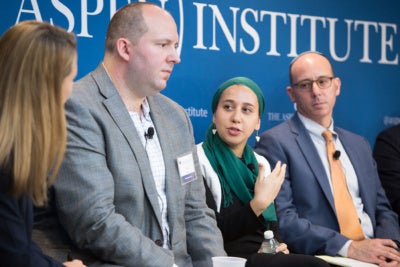Robust religious pluralism is central to our work at the Inclusive America Project, and usually the first question we are asked about our work is to explain what we mean by religious pluralism in the American context, and why it is so critical to a healthy vibrant democracy. To that end, we will launch a series of short blog posts explaining some of the concepts around the work of the Inclusive America Project. Today, we begin with our definition of religious pluralism.
 This definition is founded in the American motto e pluribus unum, that we, as a nation, are gathered together as one out of many. So our thinking about pluralism focuses on the American reality of religious diversity and the rights and freedoms guaranteed to us in our Constitution. First, religious diversity in America is increasing, and with ongoing demographic shifts, will continue to do so. But religious diversity on its own is not religious pluralism; that requires a bit more:
This definition is founded in the American motto e pluribus unum, that we, as a nation, are gathered together as one out of many. So our thinking about pluralism focuses on the American reality of religious diversity and the rights and freedoms guaranteed to us in our Constitution. First, religious diversity in America is increasing, and with ongoing demographic shifts, will continue to do so. But religious diversity on its own is not religious pluralism; that requires a bit more:
- Individuals have the legal rights and de facto freedoms to worship, believe, practice, and join in community with others according to their conscience. Individuals are also able to abstain from these activities. In the U.S., these rights and freedoms are guaranteed by the Establishment and Free Exercise Clauses of the First Amendment;
- Individuals and communities protect their own and others’ rights and freedoms to worship, believe, practice, and join in community with others, or not, according to their conscience;
- Individuals and communities protect each others’ safety to worship; and
- Communities engage with each other, acknowledging areas of deep and irreconcilable difference, but focused on areas of common ground.
And finally, since religious pluralism does not happen without sustained and diverse religious communities:
- Diverse religious communities themselves thrive, meaning leadership is good, community institutions are sustainable, community ties remain strong, and congregants know the basic theological content of their own traditions.
What is religious pluralism NOT?
Religious pluralism is not:
- The simple fact of religious diversity in a society
- A synchronistic mix of religious beliefs that pares down theological ideas to the lowest common denominator
- Religious belief being prioritized over non-belief
We believe that religious pluralism is a good in itself, worthy of being promoted and protected for its own sake. We also believe that thriving religious pluralism supports the well-being of American society and democracy more broadly. More on that in posts to come.

